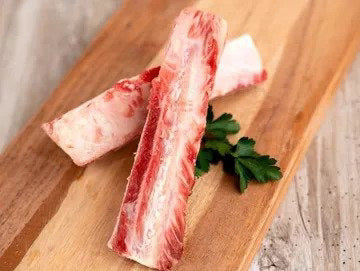
Bone to Pick: Addressing Misconceptions About Raw Bones
Raw bones have long been a controversial topic in the world of pet nutrition. While some pet owners swear by their benefits, others are cautious due to safety concerns. We aim to help you take a closer look at the advantages of incorporating raw bones into your pet's diet, while also addressing potential concerns and FAQ’s of pet parents.
Advantages of Raw Bones:
Dental Health:
Chewing on raw bones can help remove plaque and tartar buildup, promoting better oral hygiene and reducing the risk of dental diseases
Nutritional Value:
Raw bones are a natural source of essential nutrients such as calcium, phosphorus, and protein, which are important for maintaining your pet's overall health and supporting healthy bones, muscles, and joints.
Mental Stimulation:
Gnawing on bones provides great mental stimulation for pets, helping to alleviate boredom and prevent destructive behaviors such as chewing on furniture or shoes.
Digestive Health:
Some proponents of raw feeding argue that bones contain enzymes and nutrients that can support healthy digestion and bowel movements in pets.

Addressing the Risks:
Choking Hazards:
Smoked or cooked bones can splinter or break into small pieces, posing a choking hazard to pets, especially if they swallow large chunks without properly chewing them. It's crucial to supervise your pet while they're chewing on smoked or cooked bones and choose appropriate-sized ones for their size and chewing habits. Raw bones are often a better choice as they are less likely to splinter or break into sharp fragments.
Gastrointestinal Issues:
Consuming smoked or cooked bones can lead to gastrointestinal problems such as constipation, blockages, or perforations if sharp fragments cause internal injuries or obstruction in the digestive tract. Monitor your pet for signs of digestive discomfort and consult your veterinarian if any concerns arise. Raw bones are generally easier for pets to digest, making them a preferable option.
Dental Damage:
This risk is especially pronounced if pets chew too aggressively. It's essential to select bones that are suitable for your pet's chewing habits. Raw bones typically offer a more favorable chewing experience and dental benefits due to their softer texture and natural enzymes. Our sales associates can guide you towards the appropriate type of bone!
Raw bones can offer several benefits for your pet's health, including dental health, nutritional value, and mental stimulation. However, it's essential to be aware of the potential risks associated with feeding raw bones and take steps to mitigate them, such as supervising chew sessions, choosing appropriate-sized bones, and practicing good hygiene. Raw bones are not for everyone; we have many offerings for dental health. Such as bully sticks and dental chews ! As always, consult with your veterinarian for personalized advice and recommendations based on your pet's individual needs and health status.
